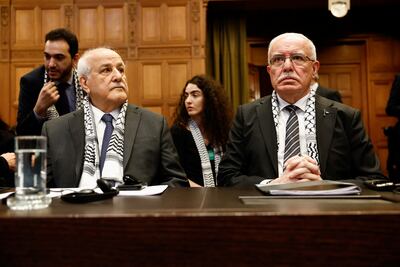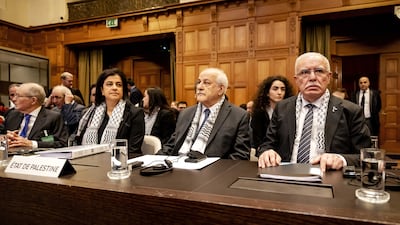Live updates: Follow the latest news on Israel-Gaza
Senior Palestinian officials on Monday told the International Court of Justice their people were suffering from Israeli “colonialism and apartheid” at the start of a week of keenly awaited hearings into the legality of the Israeli occupation of Palestinian territories.
“It is so painful to be Palestinian today,” said Palestinian UN envoy Riyad Mansour. “How could we be subjected to such loss and injustice, such lawlessness and humiliation time and time again?”
Mr Mansour appealed directly to the panel of judges at the ICJ to issue the opinion that the Israeli occupation of Palestinian territories is illegal.
This “would contribute to bringing it [the occupation] to an immediate end – paving the way to a just and lasting peace,” said Mr Mansour.
The hearings are separate from the war in Gaza and not related to South Africa's accusation of Israel committing genocide in the enclave.
They stem from a 2022 UN General Assembly vote to seek an advisory opinion from the ICJ on what states should do about Israeli occupation of Palestinian territories.
Over 50 countries will contribute for 30 minutes each until next Monday. They include the US, China and Russia, as well as a number of Arab states such as the UAE and Saudi Arabia.
Three international organisations – the Arab League, the Organisation of Islamic Co-operation and the African Union – have been granted authorisation to intervene on the last day of the hearings.
The hearings have coincided with a renewed push for a Palestinian state by world leaders since the October 7 Hamas-led attacks on Israel that killed about 1,200 people.
The attacks caused a military response on Gaza that has killed more than 29,000 Palestinians and injured at least another 69,000. About 1.5 million people out of a population of 2.3 million have been pushed to the southern city of Rafah.
“Israeli leaders no longer feel the need to hide their intentions. They speak openly of getting rid of the Palestinian people one way or another,” said Mr Mansour.
Palestinian Foreign Minister Riad Al Maliki, who was also present at the hearings in the Dutch city of The Hague, told judges that “ending Israel's impunity is a moral, political and legal imperative”.
“The genocide under way in Gaza is a result of decades of impunity and inaction,” he said.
Israel has rejected accusations of genocide. It has declined to take part in the hearings but has made a written statement that has not been made available to the public.

Pictures of mandatory Palestine were projected for the court as Mr Al Maliki spoke. He said it was not a “wasteland” before the creation of the state of Israel in 1948 – as some Israeli leaders say.
“Our people are here to stay,” Mr Al Maliki said. “They have a right to live in freedom and dignity in their ancestral land. They will not forsake their rights.”
Israeli Prime Minister Benjamin Netanyahu has repeatedly said he is opposed to the creation of a Palestinian state, which was enshrined in a 1947 UN resolution that also recognised the creation of the state of Israel.
“Demographic manipulation”
Lawyers also intervened to put forward legal arguments backing claims made by Palestinian leaders.
French-British lawyer Philippe Sands described the Israeli state's support for 700,000 settlers living illegally in Palestinian territories as “demographic manipulation of the highest order.”
“Israel has arrogated to itself the right to decide who owns Palestinian land, who may live on it, and how it must be used,” Mr Sands told the court.
“The right of self-determination requires that UN member states bring Israeli occupation to an immediate end. No aid, no assistance, no complicity, no contribution to forcible actions, no money, no arms, no trade, no nothing,” said Mr Sands.
“All UN members are obliged by law to end Israel's presence on the territory of Palestine, period.”
Mr Sands refuted US and UK claims that an advisory opinion from the ICJ would negatively impact future negotiations.
“A forthwith advisory opinion from this court makes a resolution more likely, not less likely,” he said.
Israel captured areas that Palestinians want as part of their state in the 1967 war. They include the occupied West Bank, Gaza and East Jerusalem. It withdrew from Gaza in 2005 but, along with neighbouring Egypt, still controls its borders.
Human rights lawyers have told The National they expect the hearings to increase political pressure on countries involved in negotiations to establish a Palestinian state.
Despite not being legally binding, the ICJ's opinions “carry a lot of weight”, said Gissou Nia, director of the Strategic Litigation Project at the Atlantic Council. “They could have political impact.”
The advisory opinions are likely to either reaffirm the need for a Palestinian state or the need to recognise the rights of Palestinians under occupation. “It will sharpen the need to create a state,” said Ms Nia.
World powers, including Israel's strongest allies, have been increasingly vocal about the need for a Palestinian state in the past few months.
Speaking at the Munich Security Conference a day before the ICJ hearings, US Secretary of State Antony Blinken highlighted “the imperative to proceed to a Palestinian state that ensures Israel’s security”.
Mr Blinken, however, refused to call for a ceasefire in Gaza.


